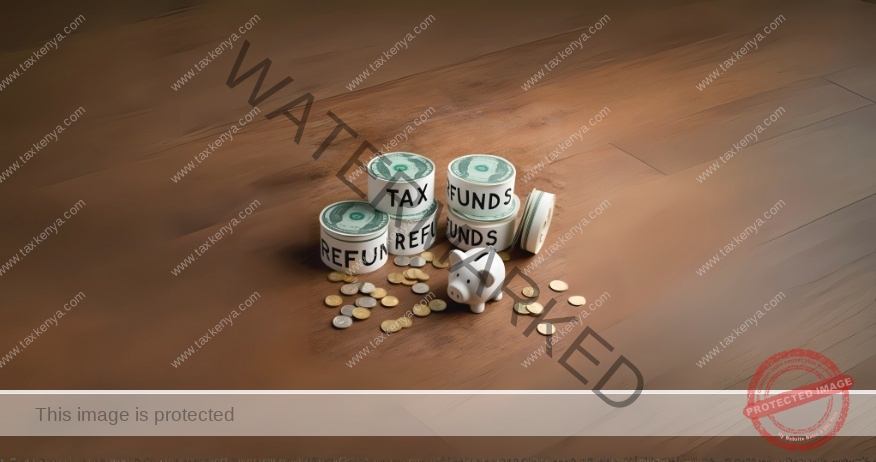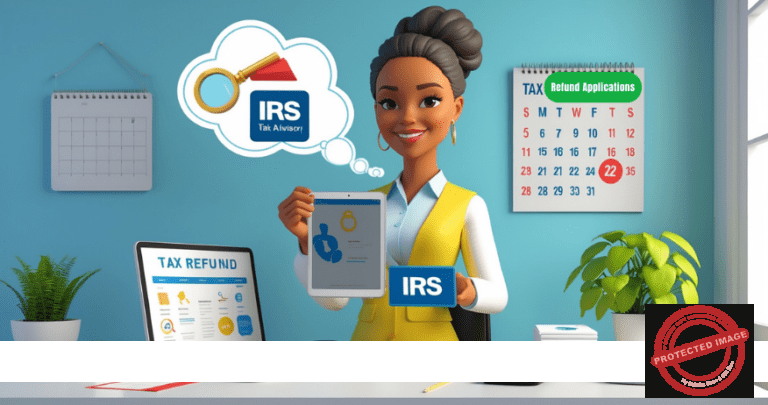Let’s be honest, I tried to process my tax refund, and it was difficult. Filing tax returns and paying taxes are not exactly enjoyable, but receiving a tax refund is. That is the highlight of taxes for many people! If you are expecting a refund from the government, you likely want it as soon as possible and in the largest amount possible. But how do tax refunds work?
Note that this article is for information only. Consult your tax expertise provider or the tax commissioner.
Why do some people get big tax cheques while others owe the tax commissioner money? What factors determine your refund amount, and how can you potentially increase it? And most importantly, what can you do to speed up the process?
We will cover almost everything you need to know about tax refunds in this article, from calculations to payment tracking and dealing with delays. We will also cover some smart strategies to potentially boost your refund application process and common mistakes that could cost you the tax money.
Whether you are a first-time tax filer or a seasoned taxpayer looking to understand the refund process, this article has you covered. Let us dive in!
What is a Tax Refund? (The Complete Breakdown)
A tax refund is money returned to you by the government when you have overpaid your taxes in any year of income. Tax refunds are in almost all tax systems that are in place in the country. These are income tax, VAT, Domestic Excise duty, Customs taxes, etc. But there is more to tax refunds than just getting money back. Understanding the mechanics behind refunds can help you better plan your finances and potentially increase your future refund amounts.
The following are some reasons why you will have tax overpayments:
- Your employer withheld too much from your paycheck as Pay as You Earn (PAYE).
- You qualified for refundable tax credits (credits for tax paid abroad)
- You had significant deductible expenses (business expenses, etc.)
- You made estimated tax payments that exceeded your actual tax liability
It is important to note that while getting a refund might feel like “free money,” it is actually your own money coming back to you. It is essentially an interest-free loan you have given the government. Getting your refund could make a real difference in your financial situation – your cash flow.
How Are Tax Refunds Calculated?
Your tax refund is not just random. It results from a specific calculation based on multiple financial factors. You may need a tax refund calculator to establish your correct amount of refund. Understanding these components can help you better predict your refund amounts and potentially increase it through strategic planning.
1. Income vs. Taxes Withheld
Tax refunds have a basis on which the calculations are based.
a. The core calculation compares your total tax liability in the year of income you are claiming refunds to your previous tax payments. The tax commissioner wants to understand what has been happening – the basis for your refunds.
b. If your employer took out more money as taxes than you actually owed, you will get a tax refund. But, if your employer did not take out enough, you might owe the tax commissioner money instead. This is why your tax returns are important. They are the primary documents for tax refunds.
2. Tax Deductions and Credits
a. Allowed tax deductions reduce your taxable income. There are standard deduction and itemized deductions. You can choose whichever is higher or what you prefer. Some of the common itemised deductions include mortgage interest, medical expenses, etc.
b. Credits directly reduce your tax bill. Refundable credits can increase your refund. Non-refundable credits can reduce tax to zero.
How to Get Your Tax Refund Faster
Waiting for a tax refund can feel like forever, especially when you have plans for that money. Although the tax commissioner has put in the taxpayers’ charter the tax refund timelines, there are some steps that you can take to speed up your refund.
a. File Refund Application Electronically (E-File)
Refund applications should be done online. However, there are taxpayers who will attempt to do it manually by going to the taxpayers’ office. Once you apply online, you will have a speed advantage. E-filing reduces human error that could delay your refund.
b. Choose Direct Deposit: The Fastest Payment Method
The tax commissioner does not pay cash. The refund money is deposited into your bank account. Bank transfers are faster than paper cheques and more secure. There is no risk of the cheques getting lost or stolen.
c. File Refund Application Early
Processing of tax refunds is on a first come basis. The earlier you put in your application, the faster you will get your money. This will also give you time to address any issues that arise.
d. Avoid Common Mistakes
Mistakes will delay processing your tax refunds. There are steps you can take to avoid common mistakes. For example, double-check all personal information (PIN, name spelling), ensure all income documents are included, review math calculations or use software to avoid errors.
Bonus Tip: If you are expecting a large refund amount, consider filing as soon as you have all your documents to get access to those funds sooner. Just be sure not to rush and make mistakes in your haste.
Tracking Your Tax Refund
Once you have filed your tax refund application, you want to know tax refund status, but the waiting game begins. But you do not have to sit around wondering. The tax commissioner provides tools on i-Tax to track your tax refund every step of the way. Here is your complete step by step to monitoring your money:
- After uploading your application, check for the acknowledgement which should be automatic.
- If you will not get the acknowledgement, get in touch with the tax commissioner – call your tax relationship manager that is the person who handled your tax maters in the KRA. You will be guided on what to do.
- Once you confirm your application is uploaded properly, do not just sit and wait. Find out who is handling your application. Again, call your relationship manager, they will tell you.
- Once you know the person handling your case, get in touch with them and ask them, “when will I get my tax refund? “. They will give you an answer. Ensure you get their contact information (phone number, email, office location, etc.) for future communications. You will need to send them the refund application acknowledgement copy.
- You will agree on the way forward. If more documents and records are required, provide them with no delay. Remember to provide copies and have them acknowledged.
Pro Tip: Keep checking with the officer how far the refund processing is. The best time to check is early in the morning before they get busy.
Why Is My Tax Refund Delayed?
How long does it take to get a tax refund? This is a question asked by many taxpayers. After applying for a tax refund, many expect to receive it within the shortest time possible. I wish it was that easy. If your refund is taking longer than expected, do not panic. Do not be harsh on yourself and keep asking, “where is my tax refund?” The Refund delays are experiences globally. There are delays with IRS tax refunds, HMR&C tax refunds, etc. Here are the most common reasons for delays and what you can do about them:
a. Processing backlogs
This is a workload factor when many applications have not been processed for several years. The tax commissioner is dealing with delayed tax refund. Some reasons that result in these delays are:
- Peak season delays, where many tax applications flood the system
- Staffing shortages where the tax commissioner faces resource challenges
Solution: If you filed your refund claim electronically and there are delays, contact (call, email or visit) the person handling your refund claim.
b. Errors and Missing Information
When your refund claim has errors, it is difficult to process. That is why you are required to take time and go through the application and ensure it does not have errors. Some errors are:
- Math errors, for example, discrepancies in calculations
- Missing forms, for example, your tax returns or reconciliations
- Incorrect banking information – wrong account numbers for direct deposit
Solution: The tax commissioner will email you a notice explaining what is needed. Respond promptly to prevent further delays.
c. Special Situation Delays
After answering all the questions and providing all the relevant records and documents, you may still experience delays in getting your tax refunds that you may even wish there is a tax refund advance. Unfortunately, the tax commissioner does not pay tax refund in advance. You get your money when you must. Your tax refund is also delayed for other reasons, such as:
- Amended returns–you previously amended your returns, or the tax commissioner did so.
- Prior year debts where the tax refund may offset the unpaid taxes.
Solution:
- Check i-Tax for updates
- Review any tax commissioner notices that may affect your tax refunds carefully.
- Contact the tax commissioner after your refund application is accepted.
Smart Ways to Use Your Tax Refund (Financial Planning)
Getting a tax refund presents an excellent opportunity to improve your financial situation. Here are some of the smartest ways to use that money:
a. Debt Reduction Strategies
Debt is not always good, especially if there are not future benefits. You can use the refund money to retire the debts.
- Credit cards – Pay down high-interest balances first and improve credit status.
- Student loans – Make an extra payment toward the principal debt with HELB.
- Medical bills – Negotiate, then pay off outstanding balances with hospitals, etc.
- Personal loans – Reduce your overall interest costs
- Creditors – pay off business creditors
Pro Tip: Use the “debt avalanche” method which is paying highest interest debts first. This will save you the most money in the long-term.
b. Build Financial Security
Refund money is your money. You can use it to build your financial security. For example, you can:
- Create an emergency fund: Aim for 3-6 months of living expenses
- Contribute to your retirement accounts with any of the RBA approved organisations.
- Add and save for your medical emergency fund
- Save for your personal or your children’s education expenses
- Invest in government instruments via the CBK.
Case Study: A kshs 50,000 refund invested in government instruments averaging 10% return could grow to a handsome amount in 30 years.
c. Smart Spending Choices
You can also use the tax refund money smartly to improve your situation or things that you own. For example, you can do the following:
- Home improvements – You can install energy-efficient upgrades in your office or home – they often pay for themselves
- Professional development – buy courses or certifications to help you boost your earnings.
- Preventative healthcare – for yourself, e.g. dental work or eye exams you have postponed for a long time.
- Vehicle maintenance – addressing vehicle issues now prevents costly repairs later.
d. Balanced Approach
Consider dividing your refund using the 50/30/20 rule:
- 50% toward financial obligations (debt/savings)
- 30% toward needs (home/car repairs)
- 20% toward wants (small treat or vacation)
Remember: While it is okay to spend some of the refund on enjoyment, prioritising financial health first leads to long-term benefits.
Tax Refund FAQs
There are many questions that are frequently asked about tax refunds. The following are 6 common questions and answers.
1. Do I qualify for a Tax Refund?
If you have any tax credits, in whatever tax system, the tax commissioner will refund you. But you have to apply to be paid.
2. What are the three stages of the tax refunds process?
a. Preparation of the application by taxpayer.
b. Processing of the tax refund by the tax commissioner.
c. Availability to pay the refunds.
3. Can I Still Get a Refund If I Did Not Work This Year?
Ideally no. Refunds are balances after you have paid tax. You need to work so that you can get a refund. It it were possible, many people would choose not to work and get refunds.
4. What Happens If I Don’t Cash My Refund Cheque?
The tax commissioner no longer pays refunds using cheques. The money is sent directly to the bank account you have provided.
5. Can Creditors Take My Tax Refund?
No. The tax commissioner cannot send money to your creditors. However, if you owe a bank money, you can provide your bank account details and then sort out the issue with your bankers.
6. How Do I Correct a Mistake After Filing?
It is simple: get in touch with the tax commissioner’s office and correct the mistake.
7. Why Did I Get a Different Amount Than Expected?
Sometimes, you will receive your tax refund, which is less than you expected and you will, “why is my tax refund so low?” Getting a different refund amount means that either your full or part of your refund claim was not approved. There are various reasons for this:
a. Mathematical error corrections by the tax commissioner.
b. You had tax debts – offset for unpaid debts.
c. Changes to claimed credits.
d. Additional tax assessments.
8. Can I ask for a debt offset using the tax refunds?
Yes, you can. Write a letter to the tax commissioner asking for the refunds to be utilised to pay off tax debts.
9. Can I be prosecuted for fraudulent tax refunds?
If you fraudulently get tax refunds, you will be prosecuted. It is a crime unlike tax debts that are civil debts.
10. Can the tax commissioner demand tax refunds paid in error?
Yest. You will be given a time within which to refund. Thereafter, you will pay back the refunds plus interest.
Final Tip:
Always keep copies of your tax documents and refund information for at least 5 years in case questions arise later. Understanding these aspects of tax refunds will better equip you to navigate the process, avoid delays, and make the most of your money when it arrives. Remember that tax situations can vary. When in doubt, consult a qualified tax professional for advice tailored to your specific circumstances. There you have it. If you have any tax refunds with the tax commissioner, no matter where you live, that is the process.
Other Articles:
1. Efile Steps




